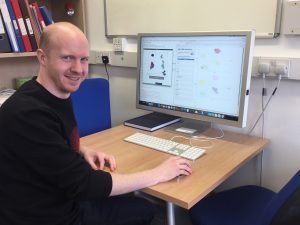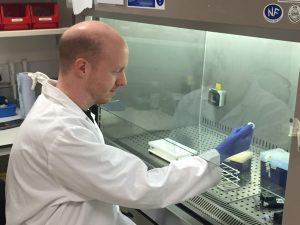Kile Green tells us about his experience as a PGR student in the ICM:

“I joined Newcastle University as an MSc Medical Sciences student a few years ago, initially taking an interest in haematopoietic stem cell transplantation and immunity, for which Newcastle is a world-leading institute. My MSc project focused on the dose effect of anti-CD52 monoclonal antibody Alemtuzumab on outcome and survival in heamatopoietic stem cell transplant recipients. This was eventually expanded into a manuscript, forming my initial first author paper.”
Kile formed a strong working relationship with his project supervisors that led directly to his PhD opportunity. This is an excellent way for would-be students to test the waters of a research career, and many like Kile subsequently embark on a research degree.
“After completing my MSc, I started a PhD with the same supervisors, along with a technical position at Newcastle, running and maintaining Newcastle University’s NanoString Technology nCounter service. My PhD project involved a combination of wet-lab experiments and data-intensive bioinformatics, incorporating in vitro development assays, flow cytometry, multiplexed hybridisation-based expression analysis and microarray experiments, along with cutting-edge single-cell transcriptomics to reveal the nature of mature blood dendritic cells subsets, their relation to monocytes and their developmental heterogeneity. The PGR support staff were fantastic throughout my PhD, offering help, support and inspiration to me both as a PhD student and throughout my role as a school representative.”
Kile has been enormously pro-active, leading or supporting many student-led activities, notably as a many-time student representative and as co-organiser of the NEPG conference. Before even completing his PhD, Kile had developed skills to the extent that he was an indispensable member of faculty, and now has a full-time post-doctoral position.
 “The availability of facilities, expertise and ease of access to clinical material at Newcastle helped me to develop a wide range of skills applicable to medical research, which I am now applying to the ‘Fetal Cell Atlas’ research initiative as a post-doc in the Haniffa Lab at Newcastle University in collaboration with 45 other institutes around the world.”
“The availability of facilities, expertise and ease of access to clinical material at Newcastle helped me to develop a wide range of skills applicable to medical research, which I am now applying to the ‘Fetal Cell Atlas’ research initiative as a post-doc in the Haniffa Lab at Newcastle University in collaboration with 45 other institutes around the world.”
You can read more about Kile and his research, or contact him through his University home page.
